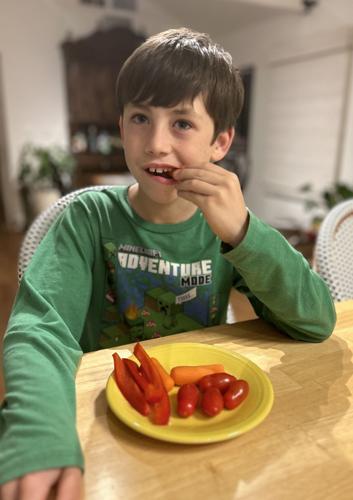Getting kids to eat their vegetables can be tough – especially when parents are running on empty. But there are creative and effective ways to make veggies more palatable to young taste buds.
Here are ten practical tips for parents who want to help their kids develop a love of vegetables. These are listed in no particular order.
Lead by example. As any parent knows, children often mimic their parents’ behavior. Make sure you are modeling healthy eating habits by letting them see you enjoy a variety of vegetables regularly.
Involve them in the process. Take your children grocery shopping and let them pick out a new vegetable to try. Involve them in the meal preparation process by asking for their help with tasks like washing, peeling or chopping. The more engaged they are, the more likely they are to eat what they’ve helped create.
Make it fun. Turn veggie consumption into a game or a fun activity. Create veggie-centric themes for meals, like “rainbow plates” with a variety of colorful vegetables. Use cookie cutters to shape veggies into interesting forms or create vegetable art on their plate.
Blend into favorites. Sneak vegetables into familiar dishes. Blend veggies into smoothies, add grated vegetables to pasta sauces or mix finely chopped veggies into meat dishes. One of my favorites is to mix 1/2 canned pumpkin into Kodiak Cakes for breakfast. This way, they get the nutritional benefits without even realizing it.
Offer dips and sauces. Kids often enjoy dipping foods that they can eat with their hands. Provide a variety of tasty, healthy dips like hummus, yogurt-based dressings or guacamole to accompany raw veggies. Skip the ranch or make your own (by using low-fat mayo and Greek yogurt instead of sour cream) to improve the nutritional profile.
Experiment with cooking styles. Experiment with different cooking methods to find what your child likes. Roasting, grilling, steaming or sautéing can bring out different textures and flavors. Some kids may like their veggies crunchy, while others might like them softer. Experiment and see what your child enjoys!
Create veggie challenges. Turn eating veggies into a challenge or a game. Encourage them to try a new vegetable each week or reward them for finishing their veggies with a small, non-food-related prize. On the flip side, don’t punish them or force them to eat a veggie they hate. No one wants to be told they have to eat something they don’t like (I’m looking at you, kale).
Plant a veggie garden. Gain your child’s interest by having them grow their vegetables in your own garden. Kids often feel good about eating vegetables they’ve grown themselves. This hands-on experience can help them develop a positive relationship with vegetables. Easy ones to try are carrots, cherry tomatoes and sugar snap peas. These can be grown in a container or larger area.
Serve as snacks. Keep a variety of cut-up veggies readily available as snacks. Having them easily accessible increases the likelihood that your child will grab veggies when hunger strikes. I am a big fan of veggie trays as they are pre-washed, pre-cut and easy to grab in a moment.
Be patient and persistent. It might take time for your child to develop a taste for certain vegetables. Don’t give up; continue offering a variety of options and celebrating small victories.
Turning your kids into veggie lovers might take some time, but with a bit of patience, creativity and fun, you’ll have a winning strategy. By following these tips, you’ll not only nourish their bodies, but also foster a positive relationship with healthy foods that can last a lifetime.




















(0) comments
Welcome to the discussion.
Log In
Keep it Clean. Please avoid obscene, vulgar, lewd, racist or sexually-oriented language.
PLEASE TURN OFF YOUR CAPS LOCK.
Don't Threaten. Threats of harming another person will not be tolerated.
Be Truthful. Don't knowingly lie about anyone or anything.
Be Nice. No racism, sexism or any sort of -ism that is degrading to another person.
Be Proactive. Use the 'Report' link on each comment to let us know of abusive posts.
Share with Us. We'd love to hear eyewitness accounts, the history behind an article.